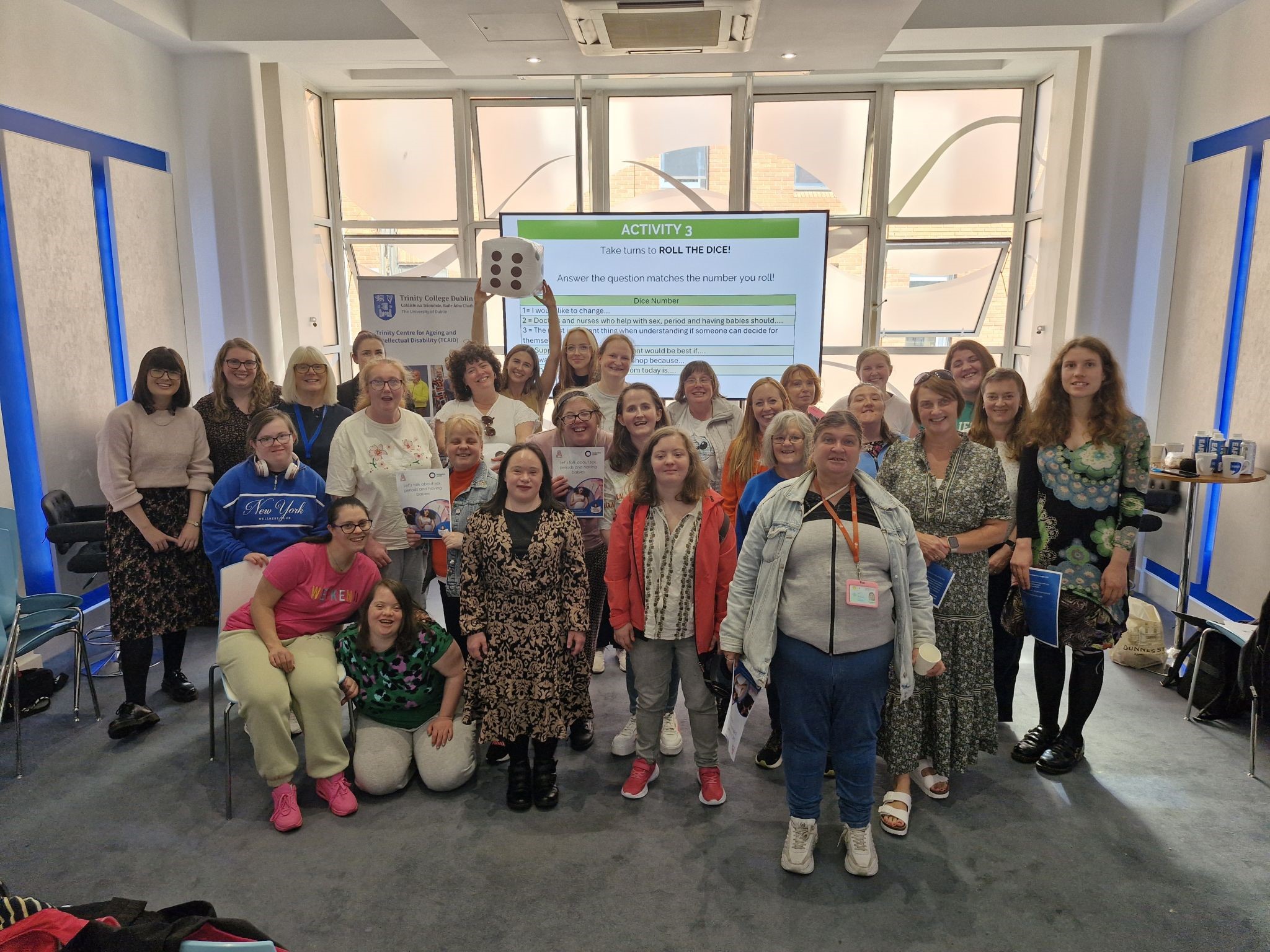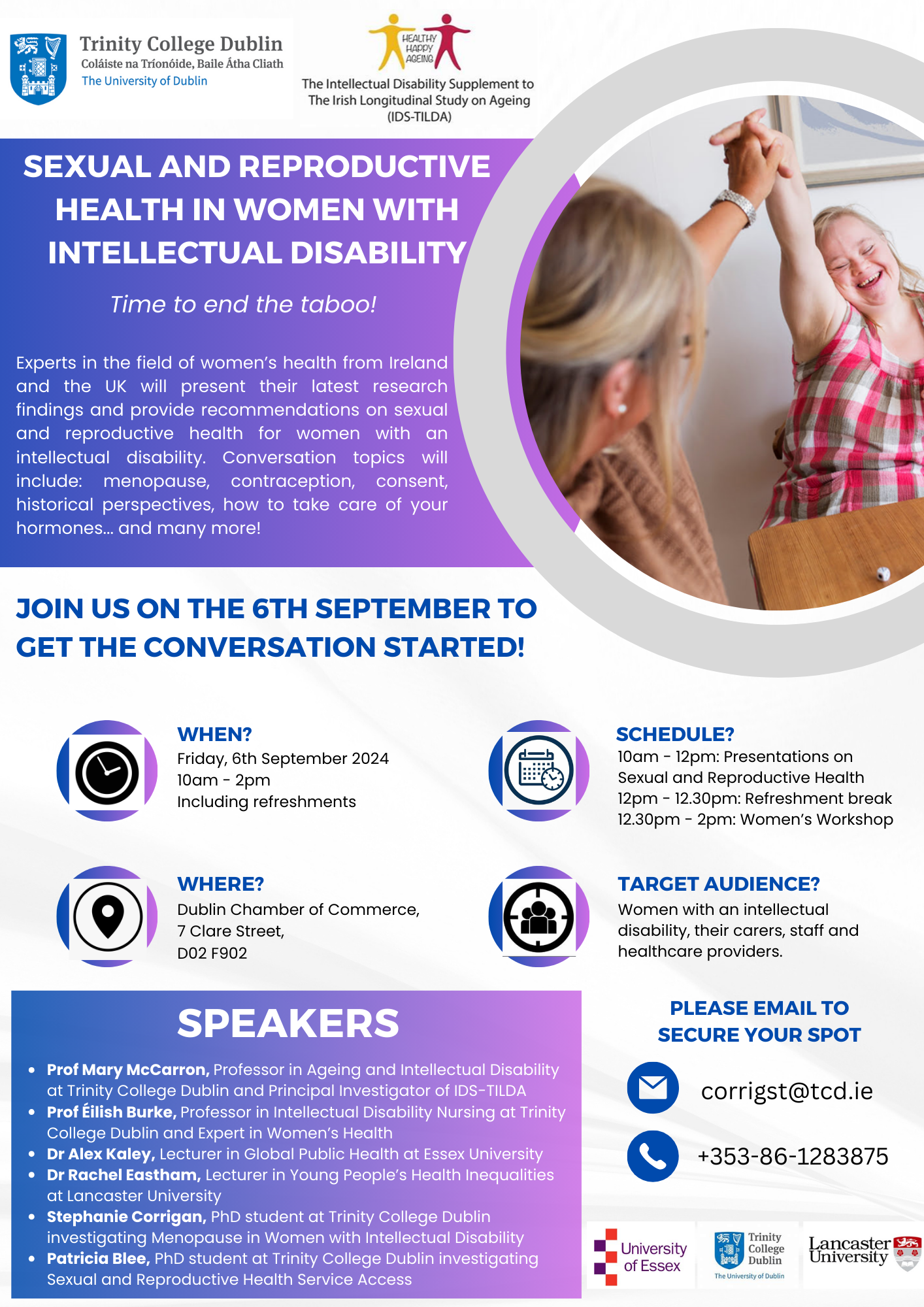September TCAID: In Focus - Sexual and Reproductive Health in Women with an Intellectual Disability

Often times women with an intellectual disability are excluded from conversations surrounding their sexual and reproductive health. In efforts to address this disparity an exciting event on Sexual and Reproductive Health for women with intellectual disabilities was held on September 6th in the Dublin Chamber, led by Stephanie Corrigan and Prof Éilish Burke. The event's target audience included women with intellectual disabilities, their carers, staff, and healthcare providers. In attendance were women with lived experience of intellectual disability, along with nurses, doctors, psychologists, and representatives from the HSE, the Women's Health Taskforce, and various services nationwide. The theme of the event was to end the taboo around sexual and reproductive health in women with an intellectual disability, with the main aim of encouraging women with an intellectual disability to open up the conversation around their sexual and reproductive health to ensure they get the services they require.
The event comprised of talks from experts in the field of Women's Health including invited professors Dr. Rachael Eastham from Lancaster University, UK, and Dr. Alex Kaley from Essex University, UK, alongside Prof. Mary McCarron, Prof. Éilish Burke, Stephanie Corrigan, and Patricia Blee; followed by a participatory workshop. Each academic presentation was accompanied by an accessible interpretation by Ms Mei Lin Yap, Ambassador Liaison Officer for TCAID, to ensure that all attendees could understand the important messages from the day.
Stephanie Corrigan, PhD student at TCAID organised and developed the idea for the event with the support of her supervisor Éilish. This event represented the first of many conversations to be held amongst women with an intellectual disability, their carers, staff, and healthcare providers on this important topic. To begin, Éilish introduced and set the tone for the event, speaking from her vast experience in nursing and academia, and most importantly from her own experience as a woman.

The first speaker was Patricia Blee, a PhD student in the School of Nursing and Midwifery at TCD. Patricia’s PhD investigates Sexual and Reproductive Health Service Access in Ireland for Women with Intellectual Disabilities. Patricia spoke about the chequered history of sexual and reproductive health in women with intellectual disability to provide context. It was extremely difficult to hear the heartbreaking history and marginalisation of people with intellectual disabilities, but important to acknowledge the past to recognise how far we have come.
Next visiting professor, Dr Rachael Eastham, a Lecturer in Young People's Health Inequalities in the Division of Health Research, Lancaster University, UK, presented on research that she is doing on long-acting contraception and about the inequities experienced by women with intellectual disability. Her research highlights the importance of educating women with intellectual disabilities about the range of contraceptive options available to them to provide them with the tools to make their own decisions, where possible.
Following this visiting professor Dr Alex Kaley, lecturer in Global Public Health, in the School of Health and Social Care at Essex University, UK, presented on an upcoming research project she and Dr Eastham are undertaking. This project exploring sexual and reproductive health, collects data on topics such as periods, sex and having babies and aims to open the conversation more on sexual and reproductive health.
Next, Stephanie presented on her initial findings from her PhD, which investigates the menopause in women with an intellectual disability. Her presentation provided insight into how the menopause may affect women with an intellectual disability in terms of their mental and behavioural health. Stephanie highlighted that women with an intellectual disability may go through the menopause at a younger age and experience menopausal symptoms differently in comparison to the general population. For these reasons, it can be difficult for healthcare providers to detect menopause in women with an intellectual disability. It is vital for all women to be educated on the menopause to ensure they can recognise symptoms when they arise to ensure they get appropriate care and support.
Next, Prof. Éilish Burke, Professor in Intellectual Disability Nursing and Director of Research in the School of Nursing and Midwifery at TCD, provided an overarching summary of women’s health in women with an intellectual disability over the age of 40 using findings from Wave 5 of IDS-TILDA. This talk rounded up the academic section of the day very nicely and highlighted why it is so important to prioritise women’s health due to the vast health discrepancies experienced by women with intellectual disabilities as they get older.
To conclude, Prof Mary McCarron PI of IDS-TILDA and Director of TCAID, provided an emphatic conclusion to the academic presentations – framing the research undertaken in terms of future research and how this can influence policy in Ireland.
An insightful workshop led by Rachael and Alex which explored issues such as contraception, consent, abortion, reproduction and much more followed the individual talks and presentations. This workshop sparked important discourse amongst the attendees of the event, highlighting issues that have historically been “swept under the carpet”.
The workshop was a great success and the feedback suggested that women with intellectual disabilities value consistent messaging around their sexual and reproductive health. They value the opinions of female health professionals who can relate to their experience, over the opinions of men. They want to be provided with accessible information and given adequate time and support to make their own decisions surrounding their sexual and reproductive health. In addition, attendees were considerate of those who have higher needs – emphasising the importance of good communication and additional resources for those who have communication difficulties.
It is vital to include women with an intellectual disability in the conversation around sexual and reproductive health, and this event was the first of many conversations on this topic with a powerful group of self-advocates in attendance.
Easy-to-Read Booket on Women’s Health

I am honoured to have had the opportunity to host such an inspiring event which highlighted the under researched topic of sexual and reproductive health in women with an intellectual disability. Women with an intellectual disability are typically excluded from conversations surrounding their sexual and reproductive health, and it is my hope that this event will be the first of many conversations held amongst women with an intellectual disability, their carers, staff, and healthcare providers on this critical topic to ensure this topic is no longer swept under the carpet. Thank you to all of the wonderful speakers and attendees who made the day so special. What a wonderful, powerful, inspiring group of women. I want to especially thank my wonderful colleague Mei Lin Yap who worked so hard to make sure the event was accessible for all attendees. Lets keep the conversation going about all things sexual and reproductive health!Stephanie Corrigan, Event Organiser and PhD Student TCAID

